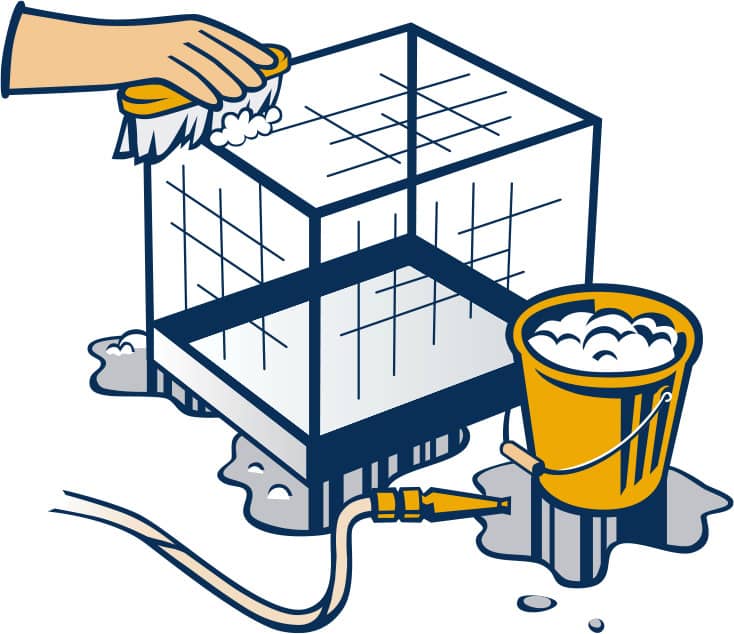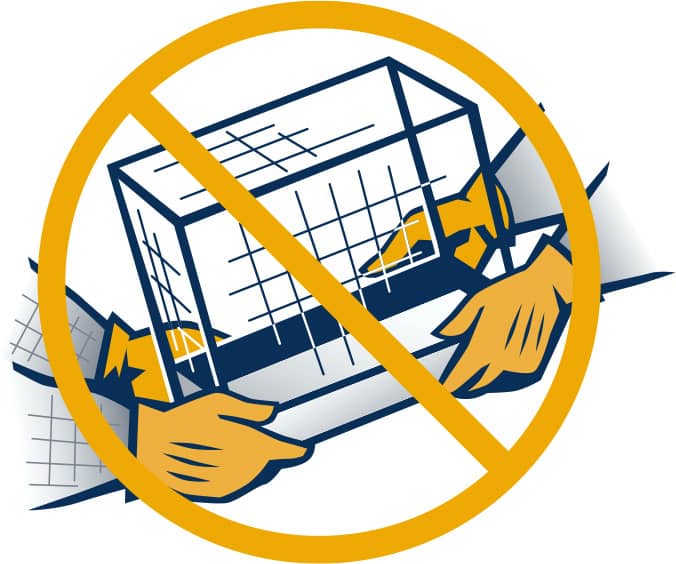
BIOSECURITY
We touched on biosecurity in chapter 10 (see here), but now we’ll take a closer look at this increasingly important topic. As you’ll recall, the slightly intimidating word biosecurity is just the official term used to describe the steps you should practice to reduce the risk of infectious disease transmission to your farm, your backyard, your aviary, or your pet birds.
As the popularity of owning and raising backyard birds rises, with even celebrities such as Reese Witherspoon, Julia Roberts, and Jennifer Aniston becoming proud bird owners, the risk of disease spreading from bird to bird and yard to yard also increases. Biosecurity is an important issue that goes well beyond the health of your own flock. The highly pathogenic avian influenza (HPAI) outbreak of 2014 and 2015 was the largest animal health emergency in United States history, affecting both commercial and backyard flocks. Since the U.S. is the largest poultry-producing country in the world, this one outbreak resulted in huge economic, production, and trade losses.
HOW DISEASE SPREADS
Here are the main ways disease spreads with poultry:
![]() Infected or diseased birds being added to a flock (including adding birds that appear to be healthy but carry diseases or germs)
Infected or diseased birds being added to a flock (including adding birds that appear to be healthy but carry diseases or germs)
![]() Exposure to wild animals, wild birds, or pet birds
Exposure to wild animals, wild birds, or pet birds
![]() Contaminated hair, shoes, or clothing
Contaminated hair, shoes, or clothing
![]() Contaminated feed, feed bags, egg flats, crates, coops, trays, water troughs, etc.
Contaminated feed, feed bags, egg flats, crates, coops, trays, water troughs, etc.
![]() Contaminated vehicles: trucks, motorcycles, wheelbarrows, etc.
Contaminated vehicles: trucks, motorcycles, wheelbarrows, etc.
![]() Contaminated equipment: scales, knives, countertops, etc.
Contaminated equipment: scales, knives, countertops, etc.
![]() Improper disposal of dead birds
Improper disposal of dead birds
![]() Impure water, such as surface drainage water
Impure water, such as surface drainage water
![]() Rodents and insects
Rodents and insects
SIX STEPS FOR BACKYARD BIOSECURITY
Now that you know how disease spreads with poultry, here are six steps, which, when done every day, will provide biosecurity and help protect your backyard flock.
Step 1: Keep Your Distance
Restrict access to your birds and your property from new birds, people, and wild animals. Separate new birds for thirty days and any birds that have been to a fair or show for at least two weeks. Other people, especially those who have birds of their own, can carry disease to your birds, so keep them distant by fencing off the area where you keep your birds and creating a barrier space between the “clean” area immediately surrounding your birds and the “dirty” adjacent area. Consider the adjacent area “dirty” even if your birds appear to be healthy. Be sure to keep your flock in a screened-in area to prevent other birds, rodents, insects, and wild animals from infecting your chickens. Wild waterfowl and wild animals, such as rodents, can carry viruses without showing any symptoms. Chicken owners with backyard ponds or who live near water should be especially careful to keep their chickens enclosed, as wild waterfowl like to congregate in these places.

Step 2: Keep It Clean
Germs can be picked up by shoes and clothing and moved from area to area. To help keep germs at bay, wash your hands thoroughly with soap and water before working with your birds. It’s a good idea to keep a separate clean pair of shoes and even clothes to wear only around your birds. One trick is to keep clean shoes and clothes in a clean covered pail at the entrance to the bird area. Scrub your shoes with a long-handled scrub brush and disinfectant to remove droppings, mud, and other debris. You also should clean tools and equipment with disinfectant. Keep your coop, waterers, and feeders clean, change food and water daily, and store feed in rodent-proof containers. Remember, too, to use proper techniques when processing birds.

Step 3: Don’t Haul Disease Home
Germs can spread when bird lovers congregate. So if you have been near other birds or bird owners, or even to a feed store, clean and disinfect car and truck tires and wheel wells, poultry cages, and equipment before going home.

Step 4: Don’t Borrow Disease from Your Neighbor
When borrowing tools, you could be borrowing disease. Don’t share lawn and garden equipment, tools, or poultry supplies with your neighbors or other bird owners. If you do bring these items home, clean and disinfect them before they reach your property. And once used, be a good neighbor and clean and disinfect them before returning them. Some items such as wood pallets and cardboard egg cartons can’t be disinfected. The best advice is never share wood or paper products.

Step 5: Know the Signs of Illness
It is important to know the signs of illness. These include a sudden increase in bird deaths in your flock; sneezing, gasping for air, coughing, or a nasal discharge; watery and green diarrhea; lack of energy and poor appetite; and a drop in egg production or soft- or thin-shelled, misshapen eggs.
Avian influenza causes swelling around the eyes, neck, and head, and purple discoloration of wattles, combs, and legs.
Exotic Newcastle disease causes tremors, drooping wings, circling, twisting of the head and neck, or lack of movement.

Step 6: Report Sick Birds
We’ve discussed the signs of disease and the steps to take to prevent illness, but what if you see one of the signs and are not sure what to do? Don’t hesitate—report sick birds. Don’t be afraid of crying wolf. State and federal authorities want to hear if you suspect a disease like avian influenza or exotic Newcastle. You can help keep your birds and your neighbor’s birds safe if disease is reported early. Call your local cooperative extension office, local veterinarian, the state veterinarian, or the United States Department of Agriculture’s veterinary services office at 1-866-536-7593. There is no charge if this results in animal disease investigation.
Should you have a bird death, be sure to dispose of birds properly. Check with your local authorities for acceptable disposal methods for dead birds. Usually this involves burial, incineration, or taking them to a landfill. They may recommend having a necropsy done by local vet or state veterinarian to determine the cause of death.

SALMONELLA
When practicing biosecurity to keep disease from spreading to your birds, remember that you also need to practice biosecurity to keep your family safe from diseases such as salmonella that can be spread from chickens to humans. Good practice includes always washing your hands after collecting eggs, cleaning coops, or handling live poultry to prevent illness or the spread of disease.
What is Salmonella?
Salmonella is a bacterium that can cause illness in people. Most persons infected with Salmonella bacteria develop diarrhea, fever, and abdominal cramps twelve to seventy-two hours after infection. The illness usually lasts four to seven days, and most people recover without treatment. However, in some people, the diarrhea may be so severe that the patient needs to be hospitalized. Salmonella infection may spread from the intestines to the bloodstream and then to other body sites and can cause death unless the person receives prompt medical care. Older adults, infants, and those with impaired immune systems are more likely to have a severe illness from salmonella infection.
Salmonella naturally lives in the intestines of poultry and many other animals. Chickens, ducks, and other poultry carry Salmonella. Poultry that carry Salmonella can still appear healthy and clean. Even organically fed poultry can have Salmonella. While it usually doesn’t make the birds sick, Salmonella can cause serious illness when it is passed to people. People become infected with Salmonella when they put their hands or other things that have been in contact with feces in or around their mouths. Young children are especially at risk for illness because their immune systems are still developing and because they are more likely than others to put their fingers or other items into their mouths
From 1990 to 2015, both the number and the size of human salmonella outbreaks linked to backyard poultry have increased. This increase in outbreaks corresponded to the growing popularity of keeping backyard poultry in urban and suburban environments. In 2016, the CDC recorded over 800 salmonella illnesses linked to backyard poultry; this is the largest number reported. For each ill person reported to the CDC as part of an outbreak, there are approximately twenty-nine people who also got sick but were not reported. Possible reasons for this lack of reporting include not having sought medical care for their illness or not having been tested for salmonella by their medical provider.
NUMBER OF LIVE POULTRY SALMONELLA OUTBREAKS PER YEAR

Number of human salmonella infection outbreaks linked to live poultry from 1990 to 2015 Courtesy of the U.S. Department of Health and Human Services and Centers for Disease Control and Prevention
Protect Your Family from Salmonella
To prevent salmonella transmission to people, it is important to wash your hands thoroughly with soap and water immediately after touching live poultry, their eggs, or anything in the area where they live and roam. You can’t see these germs on your hands, but they can easily spread to other people or things, so assume they are present. Use hand sanitizer if soap and water are not readily available and be sure to supervise children’s hand washing. Finally, remember to wash hands after removing soiled clothes and shoes.
Clean poultry cages, feed bins, water containers, and any other equipment or materials outside the house. If you have free-roaming live poultry, assume the areas where they live and roam are contaminated. Eggs collected from the hens should be thoroughly cooked, as Salmonella can pass from healthy-looking hens into the interior of normal-looking eggs.
STEPS TO PREVENT SALMONELLA INFECTION
Salmonella infection is preventable by taking a few simple steps to protect yourself and others while enjoying backyard poultry.
![]() Practice appropriate animal husbandry. Do not let live poultry inside the house, in bathrooms, or in areas where food or drink is prepared, served, or stored, such as kitchens or outdoor patios.
Practice appropriate animal husbandry. Do not let live poultry inside the house, in bathrooms, or in areas where food or drink is prepared, served, or stored, such as kitchens or outdoor patios.
![]() Do not eat or drink in the area where the birds live or roam.
Do not eat or drink in the area where the birds live or roam.
![]() Do not handle or touch chicks, ducklings, or other live poultry if you are in a high-risk group. Children younger than five years old, older adults (over sixty-five years old), and people with weakened immune systems are more likely to have a severe illness from salmonella infection.
Do not handle or touch chicks, ducklings, or other live poultry if you are in a high-risk group. Children younger than five years old, older adults (over sixty-five years old), and people with weakened immune systems are more likely to have a severe illness from salmonella infection.
![]() Do not snuggle or kiss the birds, touch your mouth, or eat or drink around live poultry.
Do not snuggle or kiss the birds, touch your mouth, or eat or drink around live poultry.
![]() Only purchase poultry from hatcheries that participate in the United States Department of Agriculture’s National Poultry Improvement Plan (USDA-NPIP) U.S. voluntary Salmonella Monitoring Program, in which voluntary participation by mail-order hatcheries will certify their flocks are monitored for Salmonella bacteria that may cause illness in humans. The intent of this program is to reduce the incidence of salmonella in day-old poultry in the hatchery and give the poultry industry a better opportunity to reduce the incidence of salmonella in its products.
Only purchase poultry from hatcheries that participate in the United States Department of Agriculture’s National Poultry Improvement Plan (USDA-NPIP) U.S. voluntary Salmonella Monitoring Program, in which voluntary participation by mail-order hatcheries will certify their flocks are monitored for Salmonella bacteria that may cause illness in humans. The intent of this program is to reduce the incidence of salmonella in day-old poultry in the hatchery and give the poultry industry a better opportunity to reduce the incidence of salmonella in its products.
![]() Shop only at agricultural feed stores that are taking steps to prevent human salmonella infections from contact with live poultry by sourcing the poultry they sell from suppliers that have adopted the USDA’s best management practices to mitigate salmonella contamination. Agricultural feed stores can provide health information to poultry owners and potential purchasers of poultry before feed purchase. Go to www.cdc.gov for more recommendations about taking care of your backyard flock, which apply to all live poultry, regardless of the age of the birds or where they were purchased.
Shop only at agricultural feed stores that are taking steps to prevent human salmonella infections from contact with live poultry by sourcing the poultry they sell from suppliers that have adopted the USDA’s best management practices to mitigate salmonella contamination. Agricultural feed stores can provide health information to poultry owners and potential purchasers of poultry before feed purchase. Go to www.cdc.gov for more recommendations about taking care of your backyard flock, which apply to all live poultry, regardless of the age of the birds or where they were purchased.
FAQs About Salmonella
If you’re new to raising and keeping backyard poultry, you might have additional questions. Here are some of the most common ones:
Can animals such as cats and dogs become sick with salmonella?
Yes, cats and dogs can get salmonella and become ill. They may also carry and transmit the germ without showing signs of illness. Other animals, such as reptiles, amphibians, and poultry, may also carry and transmit Salmonella without showing signs of illness. For more information, you can visit the CDC’s website about salmonella: www.cdc.gov/healthypets/diseases/salmonella.html.
I have a backyard garden that my chickens love to peck around in. Does thoroughly washing the produce reduce the risk of salmonella, or should I keep the chickens out of the garden?
Yes, thoroughly washing produce is always a good idea and can help reduce (although not eliminate) the risk of salmonella. There is risk of contamination of produce with germs if fresh chicken manure is put directly on food gardens. Keeping chickens out of the garden helps reduce the risk of salmonella, as well as using chicken manure that has gone through the complete composting process. There are great university resources available online which offer more information regarding composting of chicken manure.
My family has kept chickens for many years and there have never been any health problems. Why?
If your family has properly handled chickens and practiced hand washing, you’ve greatly reduced your risk of illness. Many people experience diarrheal illness and might not attribute it to a known cause or might not be diagnosed with salmonella infection by a healthcare provider. Thus, the true number of people who become ill after contact with live poultry is likely underestimated. Additionally, those who often do become ill are the elderly, infants, and those with weakened immune systems. Some healthy adults might experience very mild illness.
Is it okay to wash my chicken water dish in my kitchen sink? There is some bedding in it but no poop. Is it a health risk?
Items such as food and water bowls from chicken coops should not be washed or cleaned where human food is prepared or served, because there is a risk of cross-contamination of these areas with germs such as Salmonella.
We bought chicks that have salmonella and my son became sick and tested positive. I really don’t want to cull the flock. Can I treat them with antibiotics?
Administering antibiotics to live poultry is not recommended to “treat” salmonella. In live poultry, Salmonella is a part of the intestinal flora and often does not make them sick. Additionally, giving antibiotics when not medically necessary can result in antibiotic resistance. Before bringing home live poultry, consider if they are right for your family and check your local ordinances regarding ownership of poultry. If you purchased live poultry and are unable to keep them, talk with the store or hatchery where the poultry were purchased to see about returning or rehoming them. You can also speak with your local agriculture extension agent or poultry veterinarian.
What do I do if my backyard poultry become ill?
Talk to your local poultry veterinarian about your flock’s health. Your veterinarian can play in key role in helping you and your poultry stay healthy.
Are there diseases other than salmonella that I can get from backyard poultry?
Yes. There are some strains of avian influenza that can impact people. More information can be found shown here and at www.cdc.gov/flu/avianflu/avian-in-humans.htm and www.cdc.gov/flu/pdf/avianflu/avian-flu-transmission.pdf.
Where can I get more information on backyard poultry and salmonella?
More information about salmonella and steps people can take to reduce their risk of infection with salmonella in general can be found on the CDC Healthy Pets, Healthy People website www.cdc.gov/healthypets/diseases/salmonella.html. Along with your veterinarian, county extension agents can provide information regarding tending backyard flocks and salmonella prevention.
